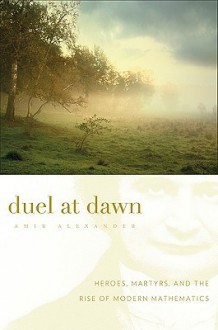Duel at Dawn: Heroes, Martyrs, and the Rise of Modern Mathematics
In the fog of a Paris dawn in 1832, Évariste Galois, the 20-year-old founder of modern algebra, was shot and killed in a duel. That gunshot, suggests Amir Alexander, marked the end of one era in mathematics and the beginning of another.Arguing that not even the purest mathematics can be separated...
show more
In the fog of a Paris dawn in 1832, Évariste Galois, the 20-year-old founder of modern algebra, was shot and killed in a duel. That gunshot, suggests Amir Alexander, marked the end of one era in mathematics and the beginning of another.Arguing that not even the purest mathematics can be separated from its cultural background, Alexander shows how popular stories about mathematicians are really morality tales about their craft as it relates to the world. In the eighteenth century, Alexander says, mathematicians were idealized as child-like, eternally curious, and uniquely suited to reveal the hidden harmonies of the world. But in the nineteenth century, brilliant mathematicians like Galois became Romantic heroes like poets, artists, and musicians. The ideal mathematician was now an alienated loner, driven to despondency by an uncomprehending world. A field that had been focused on the natural world now sought to create its own reality. Higher mathematics became a world unto itself—pure and governed solely by the laws of reason.In this strikingly original book that takes us from Paris to St. Petersburg, Norway to Transylvania, Alexander introduces us to national heroes and outcasts, innocents, swindlers, and martyrs–all uncommonly gifted creators of modern mathematics.
show less
Format: hardcover
ISBN:
9780674046610 (0674046617)
Publish date: April 30th 2010
Publisher: Harvard University Press
Pages no: 307
Edition language: English

This was a terrific book, so long as the reader has an interest in either math or in modern intellectual history. The only way this book could have been improved is if the author had included some contributions from women mathematicians. They are conspicuous by their absence. I realize that 19th c. ...






 56 years ago
56 years ago